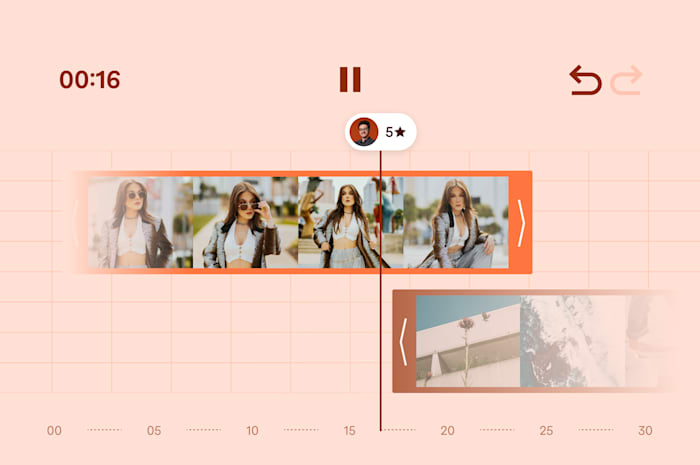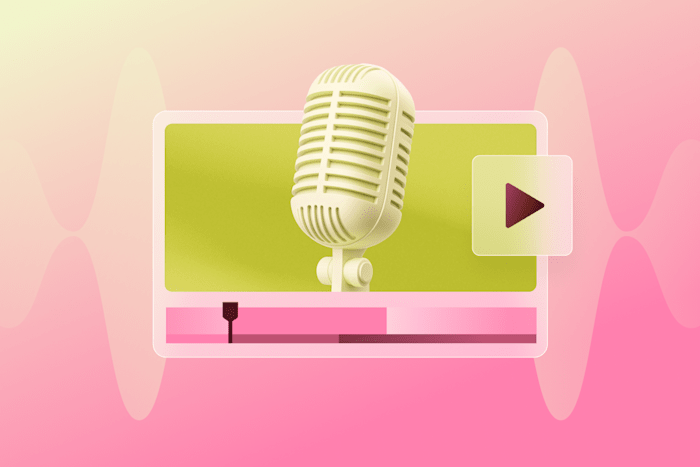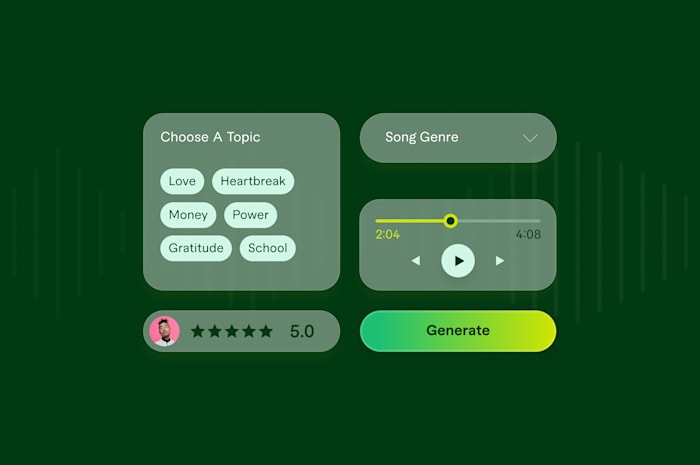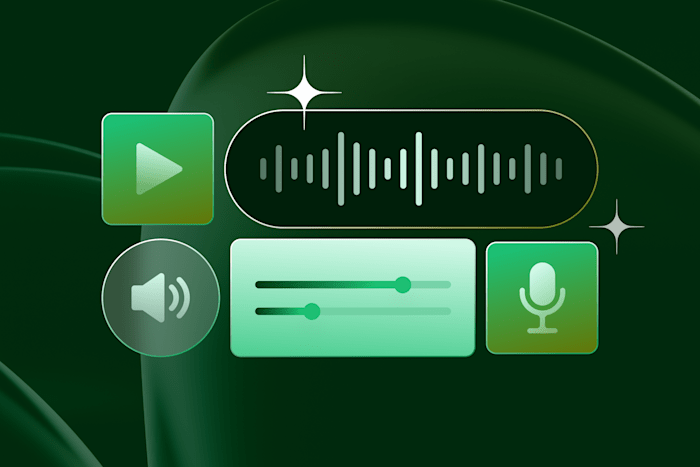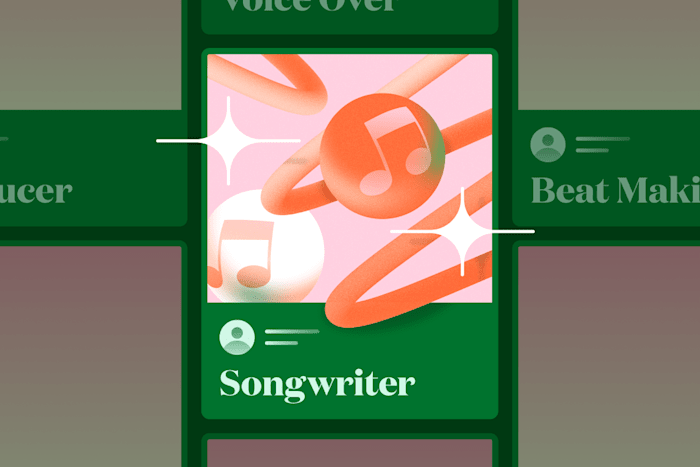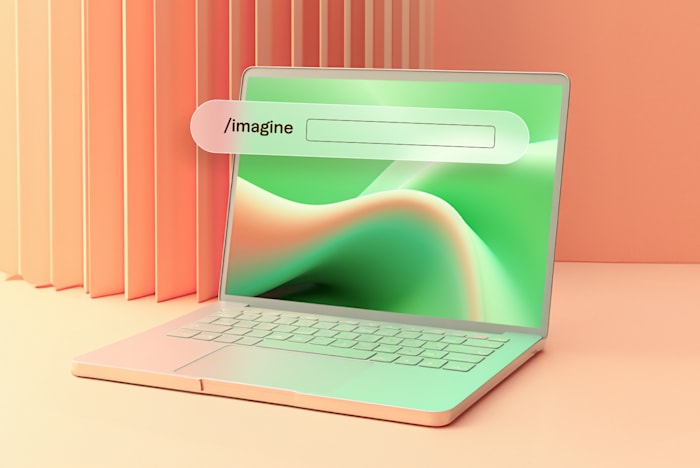Best AI Music Generators: Create Professional Soundtracks Without Musical Expertise
Create professional music without musical skills using these top AI music generators.
 June 12, 2025
June 12, 2025 11 minute reading
11 minute reading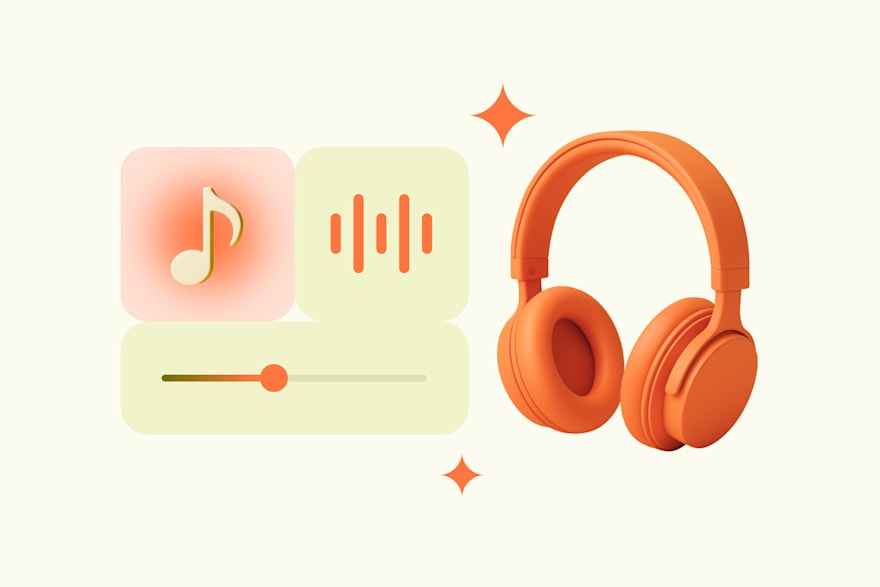
Much like in other industries, AI is already making its mark in the music industry. According to a report generated by Grandview Research, global generative AI in music market is projected to grow at a CAGR (from 2024-2030) of 30.4% from $440 million in 2023.
But how do AI music generators work, and as a creator, marketer, music producer, or even dabbler in music, what sort of ownership rights do you retain when using AI music generators? Below you’ll find the answers to all those questions, as well as a breakdown of the top ten best AI music generators available today.
How do AI music generators work?
The models used in AI music generators are pattern-recognition machines. They're fed massive music libraries—everything from classical symphonies to trending TikTok beats. They learn what makes a catchy chorus, how chord progressions create emotional responses, and which drum patterns work for different genres.
During training, the AI plays a prediction game: "If these four notes start a melody, what should come next?" It makes millions of guesses, checks against real songs, and gradually improves its musical intuition.
Best AI music generators
Below is a list of the 10 best AI music generators available today to help you find the right one for your needs.
1. AIVA
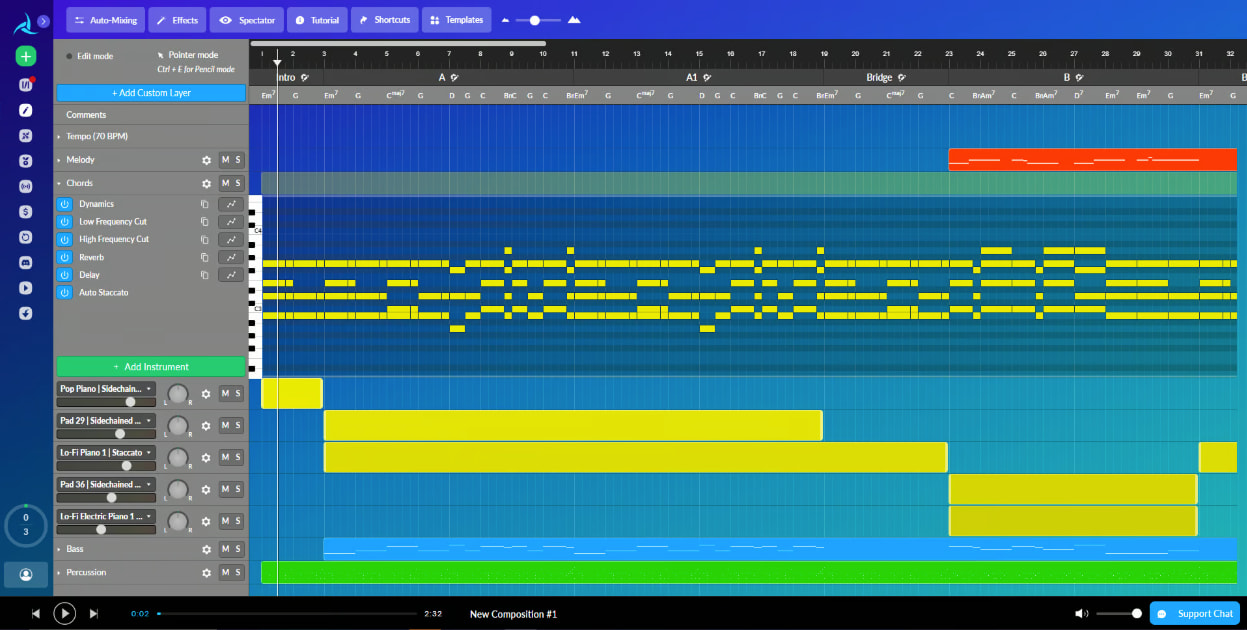
Sound Tech Insider
AIVA is best for soundtrack music, especially for video games and movies. You have limited control over editing of the AI generated tracks in AIVA. But it creates a generation profile that allows you to tweak inputs, including the key signature, duration, and how many alternatives you want. And if you’re trying to complete some of your own compositions, you can also upload a MIDI file to be used as a base for different generations.
AIVA’s pricing and license
Free: 3 downloads a month, but without copyright ownership or ability to use music commercially. You must also give AIVA credit wherever you use the music generated by the platform.
Standard: $11 per month, paid annually. 15 downloads per month. You can use music for limited monetization on social channels, but AIVA still owns the copyright to the music.
Pro: $33 per month, paid annually. 300 downloads per month. You own the copyright to the music and can monetize it however you wish.
AIVA’s pros
Upload old MIDI files and get new generated tracks.
Wide range of song templates.
Choose key signature and track duration.
Great alternative to royalty-free music.
One of the only tools that lets you edit on-platform.
AIVA’s cons
No vocals with lyrics, only background music.
Free version does not allow monetization.
Limited editing for generated tracks.
2. Soundful
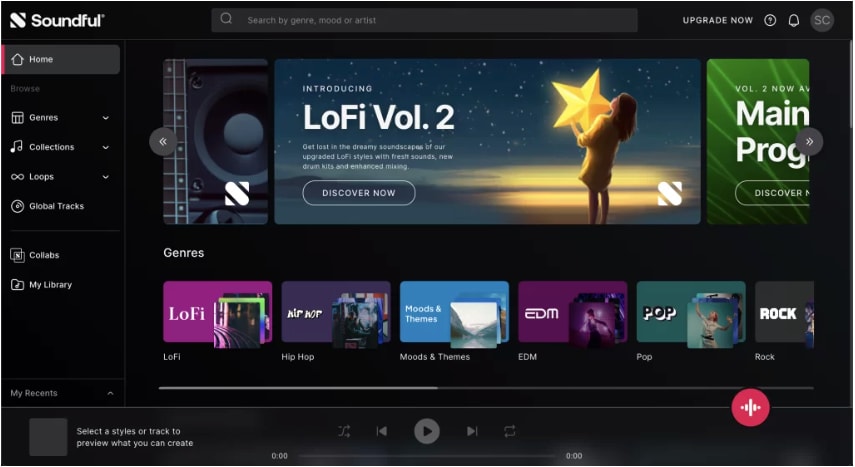
Soundful
Soundful is an AI music generator that creates royalty-free background music. Designed for content creators, Soundful generates music perfect for social media platforms like YouTube, Facebook, TikTok, Instagram, and Twitch. You can also generate movie, podcasts, and advertising video soundtrack scores.
Soundful doesn’t let you edit tracks, and your output depends on your chosen template. If you’re running on a free plan, you’ll only have access to a few free templates. There are 134 templates to choose from.
Soundful’s pricing and license
Free: 1 MP3 download per month for non-commercial use only.
Premium Plan: $5.00/month. 100 downloads per month, and commercial use permitted.
Pro Plan: $9.99/month. 400 downloads per month, commercial use permitted.
Business Tier 1: $49.99/month. 750 downloads per month and a business license.
Business Tier 2: $120.83/month. 1500 downloads per month and a business license.
Business Tier 3: $249.99/month. 3000 downloads per month and a business license.
Enterprise Plan: Custom pricing.
Soundful’s pros
Can create loops.
Wide range of templates to choose from.
Multiple music genres—LoFi, Ambient, HipHop, and EDM.
More affordable than other tools on the market.
Royalty-free music and full copyright on paid tiers.
Soundful’s cons
Cannot edit songs on-platform.
Songs are only mixed and mastered after downloading.
Can only save samples to your library, not complete songs.
Have to subscribe to the highest tier to get an exclusive license.
If you choose to unsubscribe from Soundful in the future, you can no longer use the music (your content can be taken down on social platforms).
3. Boomy
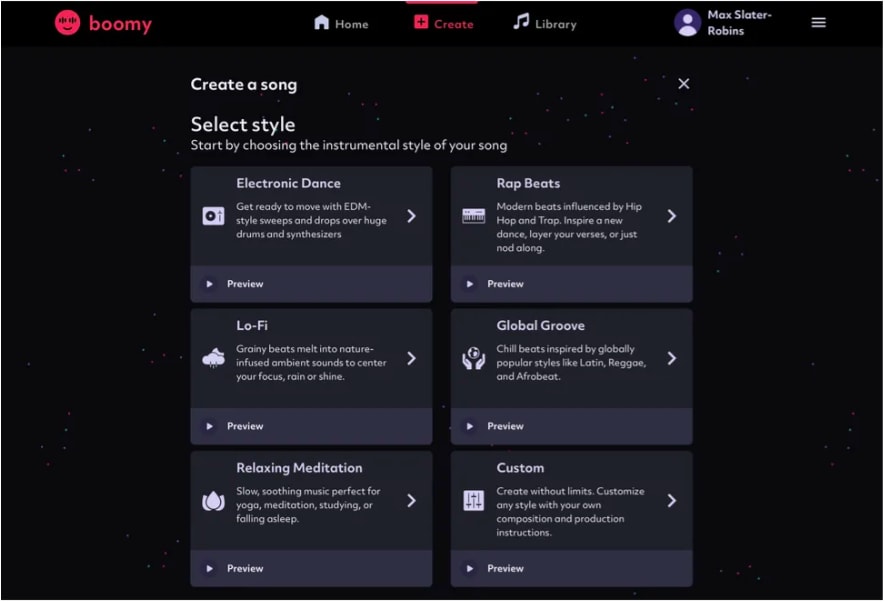
Boomy
Boomy’s AI learns from your music creation process and creates a personalized profile. Much like Soundful, Boomy generates unique music according to your inputs, but you can’t do much editing on-platform.
While Boomy can’t generate vocals from scratch, you can upload an audio with spoken text, and it can convert it to vocals. You can also record vocals on top of the track. Not only can you instantly create AI-generated new music with Boomy AI, but you can also earn royalties when others listen to your creations.
Boomy’s pricing and license
Note that even with paid plans, you have the license for commercial and non-commercial use, but don’t actually own copyright over the music. You’ll need to submit a copyright request for a song if you wish to own it.
Free: Create unlimited songs, but you can save only 25 songs and can not download any songs off the platform or monetize any of the music you create.
Creator: $9.99 per month. 500 song saves, 10 song downloads. You can use music tracks non-commercially for social media and livestreaming. This means you can’t use this music for monetized content.
Pro: $29.99 per month. Unlimited song saves and commercial use in social media advertising.
Boomy’s pros
Submit your generated song and earn revenue through royalties.
Download songs in multiple formats—MP3 and WAV.
Record your own vocals or turn speech into vocals.
Boomy’s cons
Don’t own the copyright to songs you create.
Need to subscribe to the highest tier to use for paid social media placements.
Limited editing.
Produce a music video with the help of freelance editors
4. Mubert
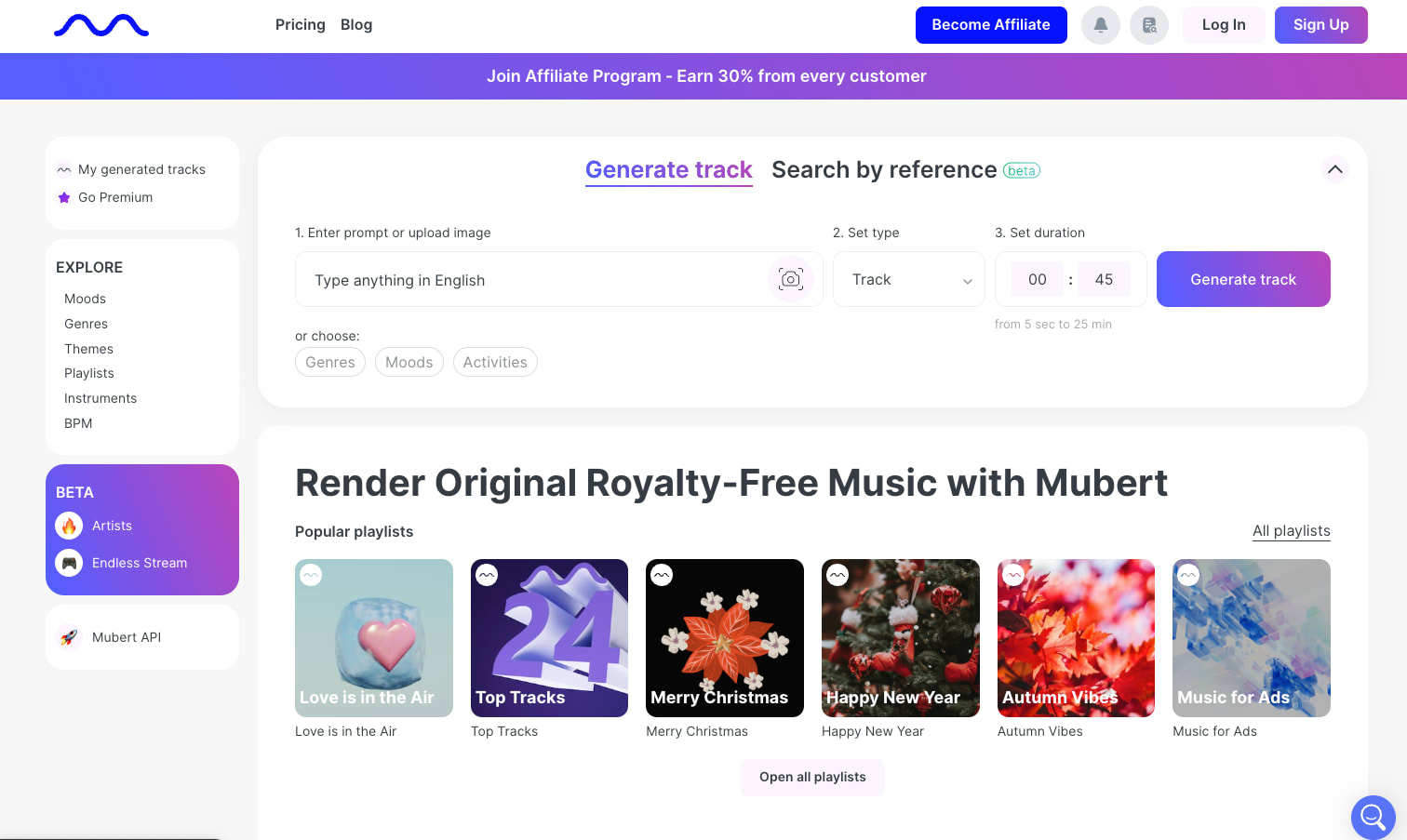
Mubert
Mubert is an AI music generator with much more customization capabilities. Much like how you use ChatGPT, you generate content with a text prompt to generate AI music on Mubert. Mubert also has various AI tools that give you complete control in creating the song you want. Tools like:
Mubert Render creates soundtracks with custom length, mood, and style that can be used for YouTube, TikTok, and podcasts.
Mubert Studio is perfect for music producers and artists. As a Mubert musician, you can submit your creations, create loops, riffs, and samples, and get paid.
Mubert API lets you integrate infinite audio soundtracks into your app or video game.
Mubert’s pricing and license
Free: Download up to 25 tracks monthly, but not for commercial or in-game use, and must credit Mubert.
Creator: $11.69 per month, paid annually. You can use Mubert music for non-monetized social media posts.
Pro: $32.49 per month, paid annually. You can use Mubert music for monetized social posts, ads, and indie video games.
Business: $149.29 per month, paid annually. You can use Mubert music for all social posts, ads, and major video games. You also get access to the Mubert API.
You can also purchase the copyright for a single track.
Mubert’s pros
API access for in-app music.
Designed to be used at scale for businesses.
Text prompt AI music generator.
Get paid as a Mubert musician.
Free plan gives you 25 tracks a month.
Mubert’s cons
Tracks in the free plan have an audible watermark (a voice says “Mubert” every few seconds).
Mubert is unusable in the free plan and is just for trying out the software.
Can’t use tracks in the free plan without crediting Mubert.
Need a higher-tier paid plan to use for monetized content.
Buying copyright for a single track can get expensive.
No vocals.
5. Soundraw
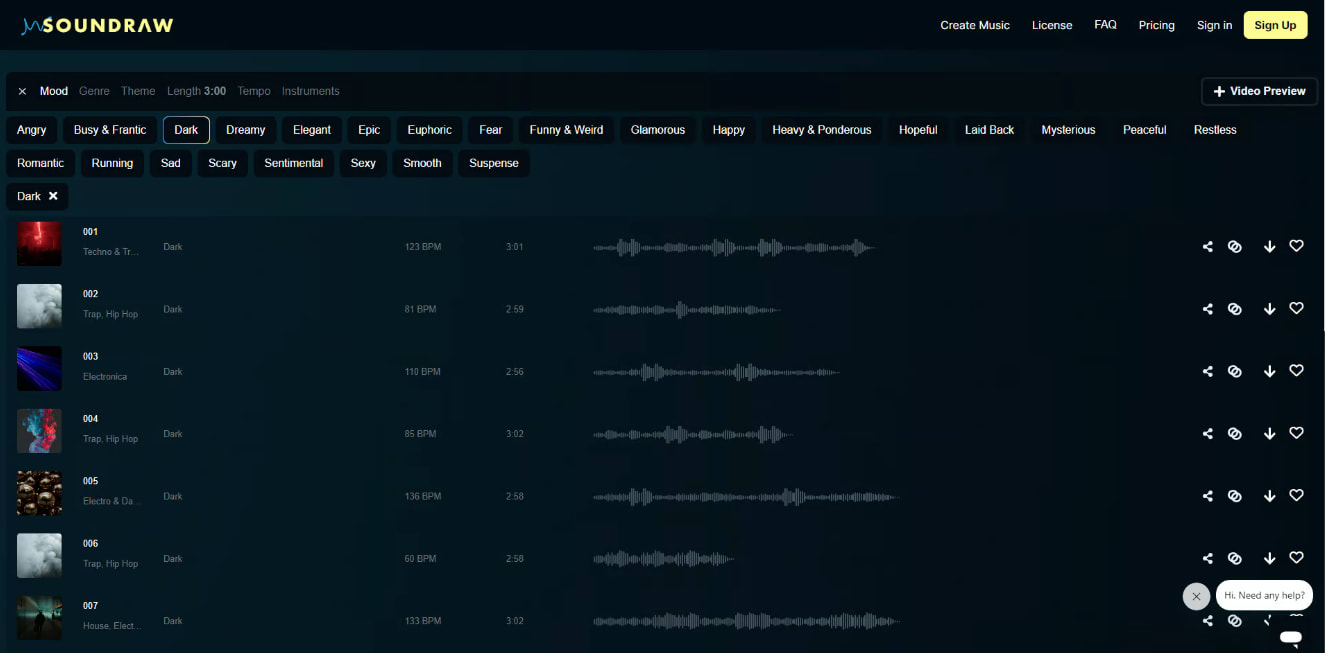
Sound Tech Insider
Soundraw is the perfect royalty-free music generator for content creators. But it’s not the best tool for music producers, since you don’t get an exclusive license or copyright over any of the music tracks.
This tool’s standout feature is the selection of moods and scenes. Instead of generating music from the genre, you can select the mood (Uplifting, Hopeful, Sad) and the scene (Travel, Fitness, Nightlife). This makes it easier for content creators to generate music that matches their videos. You can also upload your video to check if the music matches your content.
Soundraw’s pricing and license
Free: Generate music and download previews, but can’t download full songs.
Creator: $11.04/month. Unlimited downloads, but can not be distributed or used for monetary purposes.
Artist Starter: $19.49/month. 10 downloads that can be used for monetary purposes.
Artist Pro: $23.39/month. 20 downloads per month can be used for monetary purposes.
Artist Unlimited: $43.49/month. Unlimited royalty-free music downloads that can be used for commercial purposes.
Enterprise: Customized
Note that you need to remain subscribed to Soundraw to continue using the tracks.
Soundraw’s pros
Easy to use.
Designed for content creators.
Royalty-free music.
Ideal for video games, social videos, and podcasts.
Can monetize on YouTube on paid plans.
Can upload a video to check if it matches the audio.
Soundraw’s cons
Not great for music producers.
Limited control over editing.
Cannot sell or distribute music as a music track format (you can only use it in a video).
6. SongR
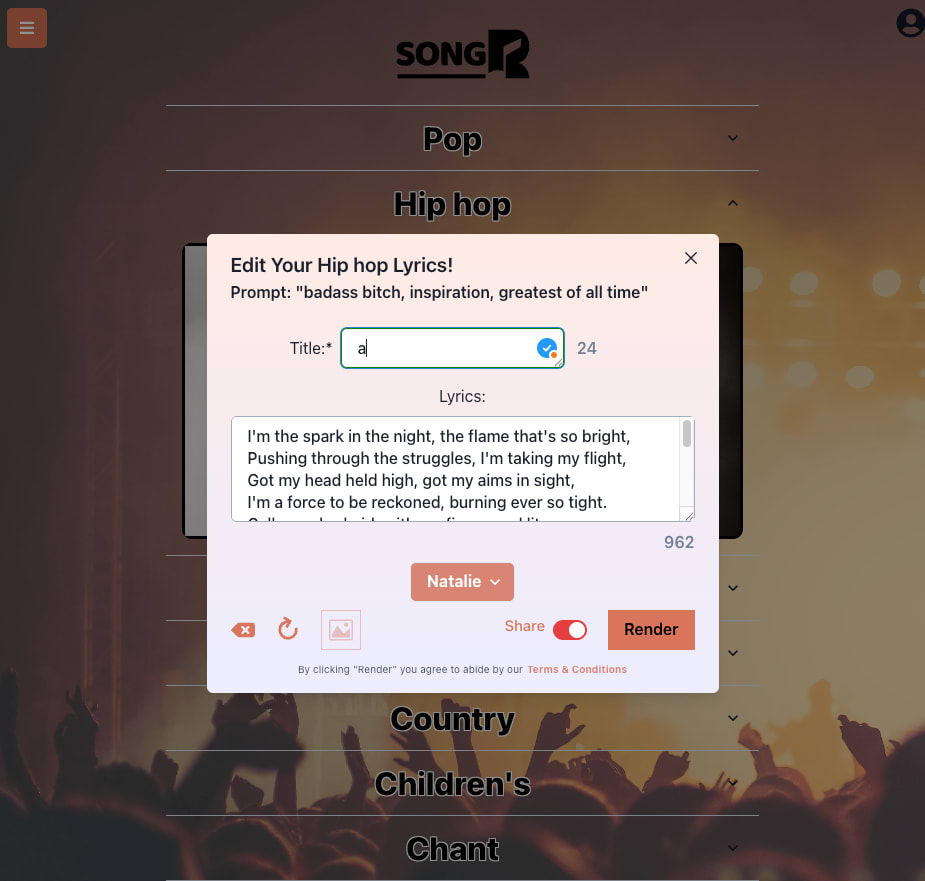
SongR
What makes SongR stand out is how flexible and user-friendly it is. Just choose a genre, type in some keywords or upload the lyrics you want, and you have a brand new song. You can download your finished songs as MP3 files for your podcast or videos, or as MP4s ready to share directly on social media.
The platform even supports real-time collaboration, so you and your friends can work on a song together, instantly making changes and hearing updates. Whether you're creating content for your small business, adding music to your gaming stream, or just having fun with friends, SongR removes the technical barriers that typically make creating music so challenging.
SongR pricing and license
Free: One free song, not for commercial use.
Token-Based System: Additional songs can be created by purchasing Song Tokens.
Subscription Plans: Paid plans start at $5 monthly, providing access to more features and song creation capabilities.
SongR pros
Designed for ease of use, requiring no prior musical experience.
Suitable for creating personalized songs, educational content, and marketing jingles.
Accessible via web browsers on various devices without the need for downloads.
SongR cons
Some genres may have limited instrumental options.
Currently supports only MP3 and MP4 formats, which may limit flexibility for some users.
Find Music Video Production Services by Freelance Videographers
7. Suno AI
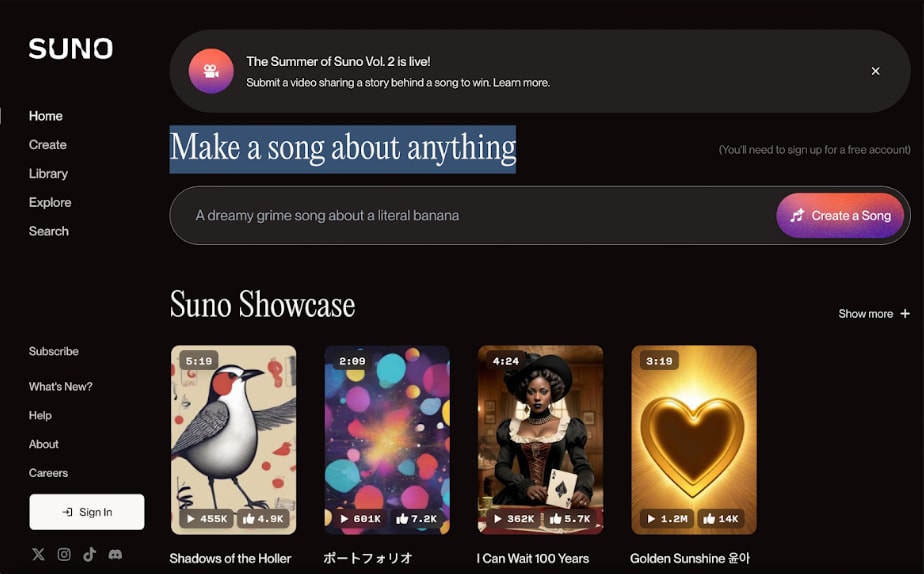
Suno AI
Suno AI allows you to create original songs by typing what you want. Unlike traditional music production that requires instruments, recording equipment, and years of practice, Suno turns simple text prompts into complete songs with vocals, instrumentals, and structure in just minutes.
Suno also allows you to generate background music and full songs with realistic-sounding vocals using AI-generated song lyrics. Users can describe the mood they want (like "upbeat pop song about summer adventures"), specify a genre (like "80s synthwave with female vocals"), or even input their own lyrics. The AI then works its magic, delivering surprisingly polished tracks that often sound like they could be playing on the radio.
Suno AI pricing and license
Free: 50 credits per day (about 5 songs with 2 versions each) for non-commercial use.
Pro Plan: $8/month (billed annually) for 2,500 monthly credits, giving you general commercial use.
Premiere Plan: $24/month (billed annually) for 10,000 monthly credits, giving you general commercial use.
Suno AI pros
Generates full songs with lyrics, vocals, and instrumentation.
Accessible to users without musical or technical backgrounds.
Produces professional-grade audio suitable for various applications.
Paid plans offer commercial usage rights.
Works seamlessly with Microsoft Copilot and offers a mobile app for on-the-go creation.
Suno AI cons
Users cannot fine-tune individual elements like instruments or mixing; adjustments require re-prompting.
Full access to premium features requires a paid subscription, which might be costly for some users.
Ongoing debates about using copyrighted materials in AI training data may pose legal uncertainties.
8. Hydra II
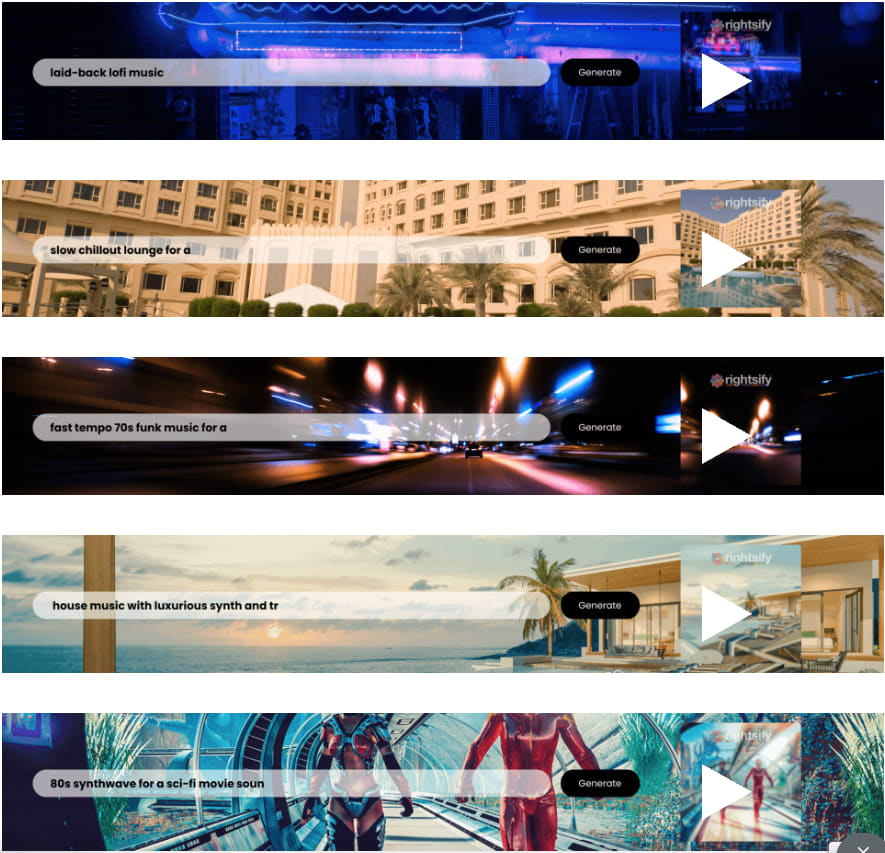
Rightsify
Hydra II by Rightsify is a great platform for content creators who need quality background music without copyright headaches. Unlike other AI music tools, Hydra II focuses exclusively on instrumental tracks, drawing from its massive library of over a million Rightsify-owned songs. This means you can use the music it creates in your videos, podcasts, or advertisements without worrying about licensing issues or royalty payments.
Hydra II allows you to customize songs as well. The platform lets you adjust tempo, add effects like reverb, create fade-outs, and even separate individual instruments for detailed editing. The system responds to prompts about genre, mood, and instrumentation, allowing you to generate music that matches your needs.
Hydra II pricing and license
Free: 10 free generations limited to 30 seconds for non-commercial use only.
Professional Plan: $39/month for 150 generations per month with commercial use permitted.
Premium Plan: $99/month for 500 generations per month, commercial use permitted, and ideal for businesses and musicians.
Hydra II pros
Offers a comprehensive suite of editing tools, allowing users to fine-tune compositions to their specific needs.
Uses a proprietary dataset, so that all generated music is free from copyright infringement concerns.
Designed to be intuitive, making it accessible to users without technical or musical expertise.
Suitable for content creators, marketers, event planners, and more, providing music for videos, advertisements, events, and other commercial uses.
Hydra II cons
Does not support vocal or lyric generation, which may limit its use for specific projects.
Full access to features and commercial use rights necessitates a paid subscription, which might be a barrier for some users.
The free tier offers minimal functionality, primarily serving as a trial with restrictions on usage and duration.
API integration is granted based on specific use cases, potentially limiting immediate access for some developers.
9. Udio
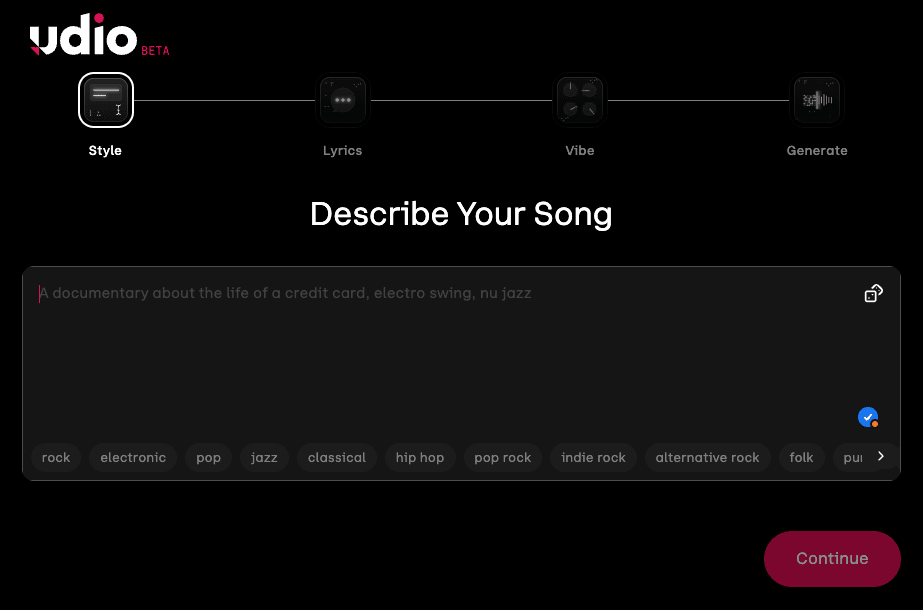
Udio
Launched in April 2024 by former Google DeepMind researchers, Udio creates beats and fully-formed tracks with realistic vocals and lyrics. All you have to do is describe what you're looking for—whether it's a "heartfelt country ballad" or an "upbeat dance track."
What sets Udio apart is its powerful editing toolkit and genre flexibility. Users can extend sections, remix elements, or fine-tune specific parts of their creations without musical expertise. The platform supports everything from pop and hip-hop to classical and EDM, making it versatile enough for content creators, marketers, and curious music lovers.
Udio’s pricing and license
Free: 100 credits per month plus 10 daily credits, can be used for commercial use, but must give credit to Udio.
Standard Plan: $10/month for 200 monthly credits and ownership rights.
Pro Plan: $30/month for 4,800 credits per month and ownership rights.
Udio’s pros
High-quality output with realistic vocals.
User-friendly interface.
Supports a wide range of genres and styles.
Active, collaborative user community.
Flexible pricing suitable for various needs.
Udio’s cons
Limited usage on the free plan.
Requires an internet connection to generate music.
Legal ambiguity over copyright concerns related to training data.
10. MusicGen
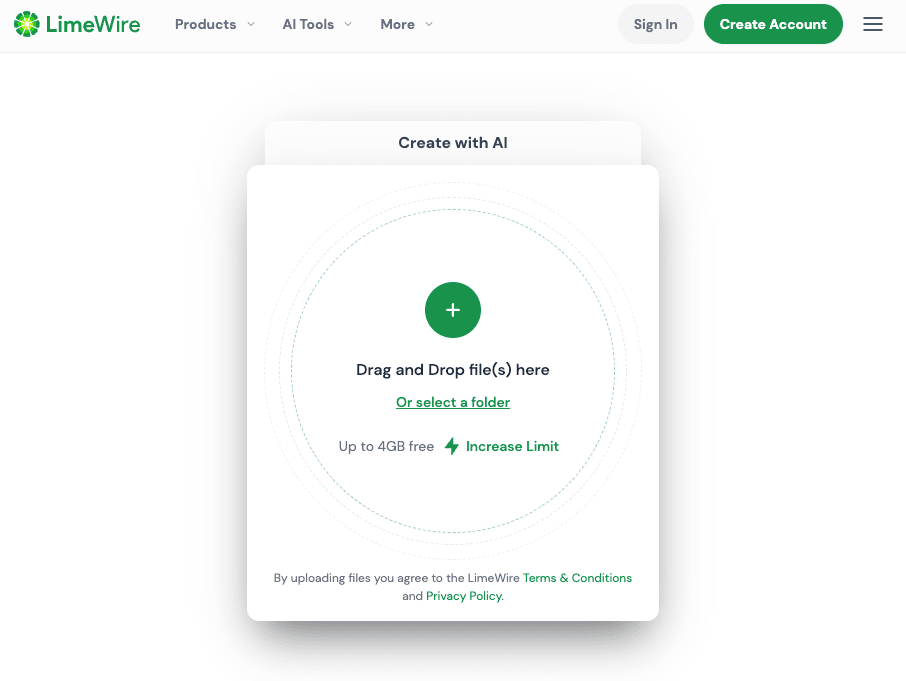
Limewire
This AI system can create original musical pieces based on text descriptions like "upbeat jazz with saxophone" or with a melody you provide. Instead of using multiple complicated steps to generate audio, MusicGen employs a single-stage process that produces cleaner, more consistent results.
Musicians can use it to quickly sketch out ideas or explore new genres, while non-musicians can create soundtrack-worthy compositions without playing a single instrument. Since Meta released MusicGen as open-source software, developers everywhere are building it into apps and services, making AI music creation available to anyone with an internet connection.
MusicGen pricing and license
While MusicGen itself is free and open source via Meta’s Audiocraft platform, there are third-party platforms that make MusicGen more accessible to non-developers. One of the most popular is AIMusicGen.ai, which has various paid plans.
MusicGen pros
High-quality music generation from both text and melody.
Open source with full transparency and customizability.
Commercial license included through third-party platforms.
Wide range of use cases, from game scores to YouTube intros.
MusicGen cons
The open-source version requires some technical skill to run.
Editing and advanced features are limited unless using a paid third-party platform.
Still lacks real-time collaborative or DAW-integrated editing.
Factors to consider when choosing an AI music generator
Here are a number of factors you should look into before selecting the AI music generator for your needs.
Copyright and licensing
Understanding who owns AI-generated music is crucial. Some platforms grant you full copyright ownership, while others impose limitations if trained on copyrighted materials.
Always review licensing agreements before using AI music in your content to avoid copyright strikes or legal issues. For commercial projects, choose platforms offering royalty-free, fully-licensed music with clear usage rights. Remember, generating music doesn't automatically mean you own it—some services retain partial rights or require attribution.
Editing capabilities
AI music generators offer varying degrees of control. Some deliver finished tracks with minimal customization—perfect when speed matters more than precision. Others let you adjust tempo, instruments, structure, and mix timing, which is ideal when you need that emotional swell exactly when your product appears on-screen.
For creators working with synced visuals or interactive content, look for MIDI export, stem separation, or DAW integrations that connect with professional software like Logic Pro. Your choice ultimately depends on your balance of speed versus customization needs.
Genre & style diversity
Great AI music generators offer diverse genres, from cinematic orchestras to lo-fi beats, which are crucial for creators who want to make varied content. The best platforms go beyond basic labels like "rock," providing specific options like "80s arena rock" or "indie folk," plus mood selectors for "uplifting" versus "melancholy" variations.
This musical range ensures the platform remains valuable as your content needs evolve, preventing you from being stuck with a single genre or feel/mood.
Output quality
For professional work, check if AI music tools produce studio-grade files (44.1/48 kHz WAV/MP3)—the difference between crisp audio and flat sound.
Some AI tools create compositions first, then render with samples. Newer ones using "diffusion" or "neural synthesis" produce realistic sound directly, resembling actual recordings. Before committing, test demos. Listen for clarity, naturalness, and logical flow.
Budget
AI music generators range from free tools with basic features to premium platforms with comprehensive offerings. For hobbyists adding background music to personal vlogs, free plans with watermarks or limited genres might suffice.
Professional content creators generating income will need paid plans that provide high-quality exports, commercial licensing, and consistent access. Be realistic about your needs—don't overpay for occasional use, but don't skimp if music is central to your brand.
Ethical and legal considerations
AI music platforms offer varying ownership models: full rights transfer, licensing agreements, or co-ownership arrangements. With full ownership, you retain rights even after canceling subscriptions. With licensing, you may lose usage rights to previously generated tracks upon unsubscribing—a potential disaster for established content.
Be wary of vague "copyright-free" claims; creators have faced unexpected copyright issues when platform terms changed. Additionally, most AI models learn by analyzing thousands of real songs, creating a gray area between "inspired by" and "derivative of" famous artists' styles. For professional projects, choose platforms with transparent training methods and clear copyright protection policies to avoid future legal complications.
Hire a freelance music expert today
AI music tools are powerful—and getting better every year—but they still can’t do everything. Sometimes, you need a human touch. Whether it's voiceover work, sound design, adjusting a key change to match the emotional beat of your video, mixing tracks for crystal-clear sound, or writing original lyrics that resonate with your audience, there’s no replacement for real expertise.
AI can give you a solid starting point. But when your project needs to sound polished, professional, and emotionally on point, it’s smart to call in a pro. That’s where Fiverr comes in.
Fiverr gives you instant access to experienced musicians, producers, and audio engineers who can:
Mix and master AI-generated tracks
Add custom vocals, harmonies, or live instruments
Create intros, outros, or stingers tailored to your content
Guide you on licensing, copyright, and best practices
Compose completely original pieces to match your brand
With Fiverr, you can browse portfolios, check reviews, and find the right creative partner in minutes. Whether you’re releasing a podcast, building a game, launching a YouTube series, or scoring a brand campaign, having a freelance expert can take your music from “pretty good” to “wow.”
Let AI do the heavy lifting—and let a human make it sing.
Best AI music generators FAQs
Which AI music generator is the best?
The best AI music generator is going to be dependent on your experience level, musical needs, and budget. For example, if you’re looking to become a songwriter you may want an AI music generator that gives you more control. But if you just need some generic background music for your YouTube videos, you can use a tool that relies more on templates.
Is there a free AI song generator?
Most AI song generators have a free version with limited capabilities and for non-commercial use only. But if you’re looking to make money with music online, it’s a better idea to use a paid version of an AI music generation tool.
Is Udio or Suno better?
That will depend on your experience level, musical needs, and budget.
